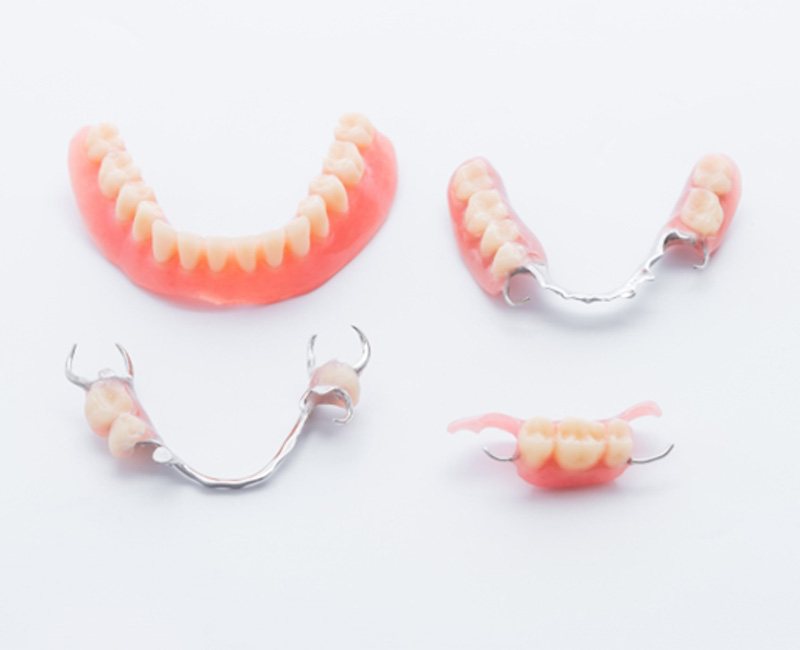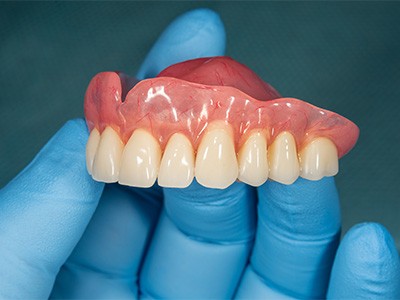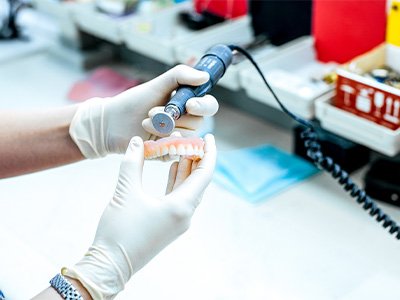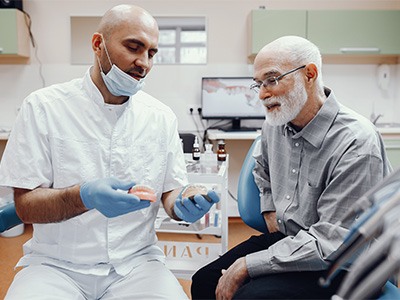Dentures – Rochester, MN
Replacing Most or All of Your Teeth

Every tooth in your mouth plays an important role in your dental health and functions. When even one is missing, you not only lose your confidence but your ability to eat and speak clearly. After several have been lost, your general and oral health become compromised if they are not replaced. To avoid dietary restrictions and complications to your mouth, Zumbro Family Dental has the solutions you need to regain a complete, healthy smile. As your general dentist, we offer dentures in our Rochester, MN dental office to fill the empty space of missing teeth.
Why Choose Zumbro Family Dental for Dentures?
- Dentist with Advanced, Specialized Training
- State-of-the-Art Dental Technology
- Judgement-Free Dental Office Environment
Treat Your Tooth Loss

After you have lost teeth, your underlying jawbone is no longer stimulated. As a result, it will begin to deteriorate, causing your remaining natural teeth to lose support. Over time, they may begin to shift toward the open space and eventually become loose. This can lead to additional tooth loss in the future. Not only will tooth loss impact your oral health, but your quality of life as well.
After you have lost teeth, it is not uncommon to have to avoid certain foods because they become too difficult to chew. This can lead to nutritional deficiencies that can hurt your general health. In addition, your appearance will suffer as your facial features may appear sunken from the lack of support. You may also develop difficulty speaking clearly.
Thankfully, you can resolve these complications with dentures or partials.
Who’s a Good Candidate for Dentures?

When you picture dentures, you may think about older people missing a whole mouth of pearly whites, but they’re far more versatile than you think! Whether you're a younger person who lost a few teeth in a row in an accident or a senior missing a whole arch, dentures from Zumbro Family Dental could be for you. At your consultation, Dr. Brong will examine your mouth to ensure you’re ready. However, even if you have untreated dental issues like cavities or gum disease holding you back, a personalized treatment plan can get your smile back on track! Continue reading below to learn the qualities of a great denture candidate.
Effects of Missing Teeth

Missing teeth caused by severe decay, damage, or age-related oral issues have a far greater effect on your mouth than you may realize. Here are some of the negative effects associated with gaps in your smile:
- Bite issues caused by your teeth shifting to fill in open space.
- Risk of digestive problems due to poorly chewed food.
- Facial sagging as your jawbone deteriorates and weakens support for facial muscles.
- Speech issues caused by your tongue’s inability to touch missing teeth.
- Lowered self-esteem and confidence due to decreased smile aesthetics.
- Increased risk of temporomandibular joint (TMJ) pain as remaining teeth pick up the slack for missing ones.
What Makes You a Good Candidate for Dentures?

To be a good candidate for dentures you simply need good oral health free from tooth decay, gum disease and other issues as well as sufficient jawbone density. As long as you meet these requirements, there’s nothing stopping you from seeking a dental prosthetic that caters to your needs!
There are several types of dentures available, but the prosthetic you decide on will ultimately depend on your case, Dr. Brong’s recommendations, and your budget. Dentures are also one of the most economical options for replacing missing teeth, so there’s bound to be one that fits into your finances and your smile.
Alternative Tooth-Replacement Options

If you aren’t a good candidate for dentures for any reason, there’s no need to despair. We offer another tooth replacement option that may meet your needs in different or better ways—dental implants.
For patients who don’t like the idea of relying on suction to keep their dentures in place, dental implants can provide something more stable. This option restores up to 70 percent of your bite force and eliminates the need for the more complex care traditional dentures require. However, patients will need a denser jawbone to support the implants required for the treatment, so not everyone will be a candidate.
If this is the case, and you’d prefer implant dentures, Dr. Brong will incorporate other treatments into your plan to pave the way for your ideal prosthetic.
Types of Dentures

Based on your situation, we’ll recommend one of the following types of dentures to help restore the function and appearance of your teeth. Don’t worry – we’ll explain the pros and cons of your options to help you determine the best one for your smile.
Partial Dentures
If you are missing several teeth, a partial denture is an affordable and convenient solution to fill the empty space. Using impressions of your mouth, prosthetic teeth are created, which are featured in a gum-colored base. It is connected to a metal framework. This allows it to connect to your remaining natural teeth to hold them in place.
Full Dentures
When all your teeth on the top or bottom jaw are missing, you will need a full denture arch. Using impressions of your mouth, an arch is created to ensure the proper fit to minimize irritation and slipping. The prosthetic teeth will be attached to them to restore your oral functions. The denture is then held in place using suction or an adhesive.
Implant Dentures
For more stability, you can choose implant dentures! This solution combines the benefits of traditional prosthetics and modern technology. Each titanium post is surgically inserted into the jawbone to restore the entire structure of your missing tooth from the root up to the chewing surface. Once you’re all healed up, we can secure lifelike restorations to your implants to create a natural-looking grin!
How Dentures are Made

Before you commit to dentures, you may want to learn how they’re made first. That’s a fair concern – knowing what went into your new teeth will help you respect them. The good news is that Zumbro Family Dental can help you get the relevant knowledge. As part of your treatment, our team will gladly share details on how dentures are made. Just keep reading to learn them firsthand, or call us to book a consultation.
What are Dentures Made Of?

No matter the type, a denture has two crucial parts: a base and artificial teeth. These components form most (if not all) of the device’s structure, so it’s worth looking at them in detail. Consider them below:
- Denture Base – A denture’s base is the structure that supports its teeth. That being the case, the part is often made of durable acrylic, nylon, porcelain, or metal. Acrylic is the most common of these base materials, though the others (especially nylon) can be good substitutes.
- Artificial Teeth – Per their name, artificial teeth are the tooth-replacing parts of a denture. Dental labs make them from resin or porcelain that matches your smile’s overall color.
The Denture Creation Process

Since every denture is customized for its patient, making one always involves a multi-step process. The relevant steps are:
- Step 1: Dr. Brong will first take a dental impression, which lets us design a plaster model that matches your denture’s size and shape.
- Step 2: Our team will send the plaster model to a dental lab that uses it to make a wax gumline.
- Step 3: The workers will set artificial teeth in the wax gumline once it’s ready. They’ll then have made a prototype denture for the final one.
- Step 4: Our practice will receive the protype denture and see if it fits your mouth. Once we’ve confirmed its fit, we’ll send it back to the dental lab.
- Step 5: A worker will place the prototype in a flask after boiling it to remove wax. The flask itself will receive plaster and sit in hot water.
- Step 6: A separator will go into the plaster layer and keep the acrylic from sticking. Next, this acrylic will be injected into the flask to replace the wax.
- Step 7: The dental lab will remove all plaster to reveal the final denture. Then, they’ll place the restoration in a bath to remove its residue.
- Step 8: The lab’s workers will remove your denture’s excess acrylic and polish its surface.
- Step 9: To ensure it works smoothly and easily, our office will fit your final denture for you.
Adjusting to Your New Dentures

Your mouth may feel sore as you adjust to your new dentures. If that happens, don’t worry – the ache is a normal symptom and should fade with time. The dentures will feel more familiar as you spend more time getting used to them.
All that said, you can take steps to speed up your adjustment. One method would be to exercise your facial muscles, strengthening them to handle dentures. Others include only eating soft foods for a while or using adhesives for security. Really, these and similar strategies would help your dentures feel natural more quickly.
Lastly, please call our office if your initial denture pain persists. Your new prosthetic may need a few more alterations!
The Benefits of Dentures

Whatever you may have heard, today's dentures are far better than those made in the past. Prior advances over the years now make them quite effective as replacement teeth. In fact, patients who wear the restorations enjoy a lot of great upsides! We at Zumbro Family Dentistry will even share the relevant details if you’d like. To that end, please read on to learn the benefits of dentures or call us at our local office.
Psychological Benefits

Suffering from tooth loss doesn’t do wonders for one’s mental or social health. As you struggle with your now-missing teeth, you’ll likely face a blow to your body image. The resulting insecurity could lead you to retreat from social life and grow ever more sad. You’d then be at risk of a case of major depression.
Of course, our dentures would let you sidestep this decline in your mood. Wearing them fills your “smile gaps” and gives you confidence in your looks. To that extent, they’d help you feel at ease in social settings among friends and family.
Clearer Enunciation

It’s just not possible to speak clearly without all your teeth. Even if you only lose a few, your tongue won’t be able to adjust itself to enunciate words well. That means any efforts at a talk would lead to speech impediments like lisps and slurred words.
Luckily, dentures could bring back your clear speech. These devices switch out your mouth’s natural teeth for sturdy artificial ones. In doing so, they support your tongue in enunciating words clearly and crisply. You’ll just need to practice with these oral appliances first.
Improves Nutrition

Unless they get treated early, missing teeth tend to result in a poor diet. Losing each tooth makes it much harder to chew tough but healthy foods. Given enough time, this process could force you to give up tough but healthy meals. You’d then see a much higher risk of malnutrition and indigestion.
The bright side is that our quality dentures will help you avoid this dilemma. Since their teeth let you chew food nearly as well as natural ones, they expand your dietary choices and boost nutritional health.
Preserves Oral Health

Your smile’s health takes a serious hit when you lose teeth. With each one that goes missing, harmful bacteria have more places to breed in your mouth. This effect can then trigger cavities, gum disease, and worse ailments. Plus, the gaps would prompt your remaining teeth to tilt until they fall out.
Luckily, dentures defend against such oral damage. They fill your smile gaps and thus keep harmful bacteria from breeding too much. Similarly, their weight can at least slow the tilting rate of your other teeth.
Expands Opportunities

You’ve likely heard that a nice smile leads to a good first impression. That much is true – showing off pretty teeth can make others think well of you. Even so, you may not have known that this positive attitude can lead to great opportunities for you. As people see you in a better light, they’ll feel more willing to share friendships, dates, job promotions, and more.
Thankfully, dentures could beautify your smile to help with first impressions. They’d make your grin gorgeous enough to draw positive feelings. From there, you’d likely enjoy a richer life.
Understanding the Cost of Dentures

Dentures are often associated with a hefty price tag, but you don't have to be rich or famous to replace your lost teeth. Dr. Brong strives to keep a complete smile within everyone's budget. Several things affect the cost of dentures, but we have the solutions you need to benefit from a high-quality denture that won't cost you an arm or a leg.
Factors That Affect the Cost of Dentures

There’s no one-size-fits-all denture because every mouth is as unique as fingerprints. Therefore, we don’t have a flat fee for a set of new teeth. Many factors affect the cost of replacing missing teeth, like:
- Consultation: Brong will examine your mouth and review X-rays to have a complete picture of your dental health.
- Preliminary Treatments: It’s not uncommon to require a little prep work, like tooth extractions, gum disease therapy, or bone grafting.
- Number of Lost Teeth: The number of teeth you're replacing will determine the type of denture you will need, as well as if you’re treating one or both arches.
- Materials: It’s better to invest in high-quality materials because they look and feel more natural. They are also durable, so you won’t have to pay for replacements as often.
Dr. Brong will create a personalized treatment plan and provide you with an estimate, so you’ll know exactly what you’ll have to pay before moving forward.
Are Implant Dentures More Expensive?

Implant dentures are more expensive initially, but they are the most affordable overall. Traditional dentures need replacing every 5 to 7 years. Implant dentures can last for decades with the correct care, like brushing and flossing. Not to mention, they are the only method of preserving your jawbone to avoid common issues caused by tooth loss. As a result, you’re less likely to need costly procedures to save more money down the road.
Does Dental Insurance Cover Dentures?

Dental insurance can be used for your consultation and may pay a portion of the cost of preliminary procedures after meeting your annual deductible. Dentures are a major service, so they are covered by 50% until meeting your yearly limit. A member of our office will work on your behalf with your dental insurance to maximize your coverage to lower the amount you’ll pay out-of-pocket. They’ll explain how your benefits are being used and your payment options for any remaining balance.
Other Options for Making Dentures Affordable

Your financial situation shouldn’t stand in your way of replacing lost teeth. Our office accepts various payment methods to keep dentures affordable, including:
- Traditional Payments: We accept all traditional payment methods, including cash, checks, and credit cards.
- Monthly Payments: You can pay any out-of-pocket expenses using monthly installments through a third-party financing company, like CareCredit. Based on your credit approval, you can benefit from little or no interest in financing.
Dentures Aftercare

Dentures may not be real teeth, but they still require regular care and maintenance. Keeping your restoration in good shape helps ensure that you will be able to use it for many years before needing to get a new one. Below you’ll find some important denture care tips; our team might offer additional advice depending on the specifics of your situation. Bear in mind that even after you get replacement teeth, you should continue to visit our office for regular checkups every six months. In addition to checking for health issues like gum disease and oral cancer, we can also examine your dentures to make sure they’re still in good condition.
Removeable Dentures
Remove After Eating
Every time you enjoy a snack or meal, bits of food debris are left on your dentures. To make sure your new teeth stay free of food and plaque, remember to take them out once you’re done eating so that you can rinse them off. Make sure that the water is lukewarm; using hot water can lead to warping, which can easily result in dentures that don’t fit properly.
Clean Your Restoration
In addition to post-meal rinsing, you also need to give your dentures a thorough cleaning at least once a day. Take them out of your mouth and brush them thoroughly with a denture cleanser or mild dish soap. (You should only use a soft-bristled toothbrush; hard bristles make it too easy to damage your dentures by mistake.)
If you aren’t immediately putting your dentures back in your mouth after cleaning them, you need to make sure they stay moist so that they can retain their shape. It’s highly recommended that you keep your restoration in a denture-cleansing solution when it’s not in use. When it’s time to put your denture back in, always remember to rinse it off first.
Keep Your Dentures Safe
While dentures are made to be durable, they could break if you drop them by accident. Before taking your prosthetic teeth out, you should put a towel on your bathroom counter. That way, your dentures will have a soft place to land if you happen to drop them.
You also need to make sure your dentures are safe when they’re not being worn. Store them in a place where your children and pets can’t get to them.
Remove When You Sleep
Wearing your dentures 24/7 might seem convenient, but doing so can increase your risk of gum disease, pneumonia, and other health issues. Also, the pressure from dentures can reduce blood circulation in your gums, which can lead to sores if you don’t periodically give your soft tissues a break. In short, it’s better for your mouth if you take out your dentures before you go to bed.
Notice Changes
Does it seem like your dentures have been irritating your gums recently? Have you seen signs of an oral infection? Is your prosthetic damaged in some way? As soon as you notice any problems with your dentures, call our office to see what solutions are available.
Dentures FAQs
Can I Sleep with My Dentures in My Mouth?
When you first receive your new dentures in Rochester, your dentist will instruct you to wear them for 24 hours, even at night. However, after the first day, it's best to take them out before going to bed. Although no one wants to be caught without their teeth, your general wellness and the lifespan of your new smile rely on it. Dentures restrict blood circulation to your gums, which can cause pain, inflammation, sores, and infections if you don't give your mouth a break. Not to mention, your mouth is a hot spot for bacteria that can affect your health and weaken your dentures over time. It's best to remove them and place them in an overnight soaking solution while you get the rest you need.
Does an Upper Denture Always Cover the Palate?
If you have concerns about an upper denture diminishing taste sensations, you have many styles of prosthetics to choose from, including palateless options. You may benefit from one that looks like a horseshoe, like those used with dental implants or for the lower arch. Your denture dentist in Rochester we'll learn more about your preferences to recommend the ideal denture for your needs and comfort.
Can I Eat Steak with Dentures?
Yes, it's entirely possible to eat steak with dentures, but it's not something you're going to want to do all the time. Steak requires a lot of chewing, which puts wear and tear on your dentures. It can also make your gums sore or cause jaw pain. It's best to tenderize your steak before cooking it. Cut it into small pieces to make it easier to chew. You may also find a denture adhesive helpful to prevent slipping or irritation. It's best to have steak and other chewy foods in moderation to make your dentures last longer.
Is a Broken Denture a Dental Emergency?
You need your dentures to get through your day because you can't go without any teeth. Therefore, a broken denture is a dental emergency. It's best to stop wearing your dentures and use an old pair if possible. Do not use any glue or adhesives to fix it on your own. They can contain toxic ingredients and don't hold up well in moist environments, like your mouth. Instead, contact our office for an appointment. We will assess the situation to determine if you need a repair or a replacement.





